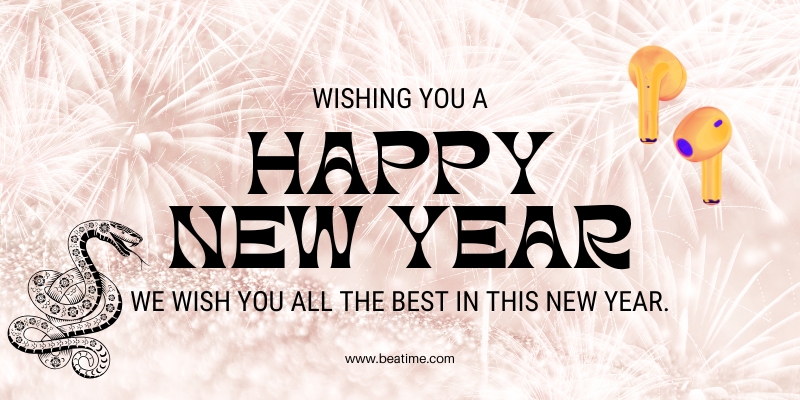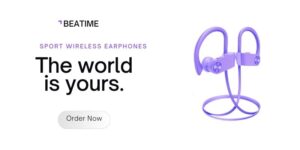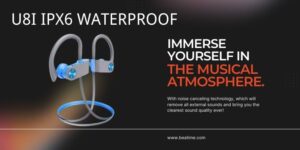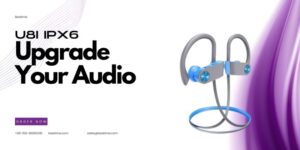
The Bluetooth earphone market1 is rapidly evolving, leaving businesses uncertain about how to plan for future customer needs.
Without foresight into emerging trends2, businesses risk falling behind competitors, missing opportunities for growth, and losing customer trust.
By understanding 2025 trends2, B2B buyers can make informed decisions, optimize their product offerings, and secure a competitive edge in the market.
In 2025, Bluetooth earphones will showcase AI-driven audio3, sustainable designs4, and advanced interoperability5—offering B2B buyers the opportunity to innovate and grow their market share.
Table of Contents
What Are the Key Bluetooth Earphone Trends to Expect by 2025?
Bluetooth earphones in 2025 will embrace cutting-edge technologies like AI-enhanced functionality3, eco-friendly materials4, and seamless integration5 with smart devices.
In 2025, expect AI features3, sustainability4, and IoT compatibility5 in Bluetooth earphones, reshaping the market for better performance and user satisfaction.

Future Trends That Will Define Bluetooth Earphones
1. AI-Enhanced Audio Technology3
- Noise Adaptation: AI algorithms will offer adaptive noise cancellation6 based on the environment.
- Speech Recognition: Improved voice assistant compatibility7 for commands and controls.
- Personalized Sound Profiles: Earphones will analyze user preferences for tailored audio experiences8.
2. Sustainability Initiatives4
- Use of recycled plastics9 and biodegradable materials for casings and packaging.
- Low-energy Bluetooth chips10 to extend battery life while reducing energy consumption.
3. IoT Interoperability5
- Earphones will integrate with IoT ecosystems11, supporting wearables, AR/VR devices, and smart home technologies.
- Real-time device switching for uninterrupted connectivity across multiple gadgets.
4. Health and Fitness Tracking12
- Built-in biometric sensors for heart rate13, oxygen levels, and posture monitoring.
- Real-time syncing with health apps14 for actionable insights.
| Trend | Key Features | Benefit for Buyers |
|---|---|---|
| AI-Enhanced Audio | Personalized sound, adaptive noise | Higher user satisfaction |
| Sustainability | Eco-friendly materials, energy savings | Appeals to conscious consumers |
| IoT Interoperability | Multi-device support | Access to new customer segments |
| Health and Fitness | Biometric tracking, app integrations | Expands product use cases |
B2B buyers can leverage these trends to tap into niche markets and boost customer loyalty.
How Can B2B Buyers Benefit from These Advancements?
By aligning with upcoming trends2, B2B buyers can offer value-added products, attract diverse markets, and strengthen their competitive advantage.
Snippet: Future earphones with AI and IoT compatibility help B2B buyers differentiate their offerings, improve brand value, and enter new markets.
Why These Innovations Matter for B2B Buyers
Enhanced Consumer Appeal
- AI-powered earphones3 ensure premium audio experiences.
- Sustainability features4 resonate with eco-conscious customers, building brand trust.
Expanding Market Opportunities
- IoT integration5 attracts tech-savvy customers who seek connected ecosystems.
- Health monitoring earphones12 appeal to fitness enthusiasts and wellness industries.
Differentiation in Competitive Markets
- Offering personalized designs or unique features (like multi-point connectivity15) sets businesses apart.
- Customization opportunities increase perceived value and justify higher pricing.
Example Use Cases:
- Retail Chains: Exclusive sustainable earphones to target green consumers.
- Tech Brands: IoT-compatible models to complement smart home devices.
- Fitness Brands: Biometric-enabled earphones for gym enthusiasts.
What Should B2B Buyers Look for When Sourcing Earphones in 2025?
Sourcing strategies should prioritize innovation15, scalability, and supplier reliability to stay ahead of the curve.
Snippet: In 2025, prioritize suppliers offering AI capabilities, eco-friendly designs, and scalable logistics for consistent quality and performance.
Sourcing Checklist for B2B Buyers
Focus on Advanced Features
- AI-driven audio enhancements3 for cutting-edge sound quality.
- Future-proof codecs like aptX Lossless16 and LC3 for high-resolution streaming.
Evaluate Supplier Sustainability
- Ensure compliance with global environmental standards17.
- Look for suppliers using sustainable materials and energy-efficient production lines.
Assess Scalability and Support
- Choose suppliers with capacity to scale production for growing demand.
- Opt for partners offering robust after-sales support and customization services.
| Sourcing Factor | What to Look For | Impact |
|---|---|---|
| Advanced Features | AI, low-latency codecs, biometrics | Enhanced product differentiation |
| Sustainability Practices | Recycled materials, eco-packaging | Appeals to eco-conscious markets |
| Scalability and Logistics | Large-scale capacity, fast shipping | Smooth supply chain operations |
By addressing these sourcing considerations, buyers can meet future demands effectively.
What Are the Potential Challenges for B2B Buyers in 2025?
B2B buyers may face challenges like rising production costs18, compliance complexities, and evolving customer expectations.
Key challenges in 2025 include navigating compliance, managing higher costs, and meeting rapidly changing consumer demands.
Challenges and Solutions for B2B Buyers
Rising Production Costs
- Challenge: Advanced technologies and sustainable practices may increase production costs.
- Solution: Negotiate bulk discounts with suppliers and focus on value-added features to justify premium pricing.
Evolving Compliance Requirements
- Challenge: Stricter regulations on materials and data security (e.g., GDPR for IoT devices).
- Solution: Partner with suppliers knowledgeable about regional compliance and certification requirements.
Meeting Diverse Customer Needs
- Challenge: Customers increasingly demand tailored experiences and faster delivery.
- Solution: Invest in flexible supply chains and customization options.
Despite these challenges, proactive planning and collaboration with reliable suppliers can ensure sustained success.
How Can B2B Buyers Prepare for 2025 Trends Today?
Preparation involves strategic partnerships, market research, and proactive investments in innovation.
B2B buyers should start investing in sustainable sourcing, AI-powered features, and supplier collaboration to future-proof their offerings.
Actionable Steps for Buyers
Partner with Innovative Suppliers
- Select suppliers already incorporating AI and sustainability into their products.
- Look for partners offering customization and scalable production lines.
Conduct Consumer Trend Analysis
- Monitor shifting preferences in audio quality, eco-consciousness, and tech integration.
- Invest in market research to identify untapped opportunities.
Strengthen Supply Chain Flexibility
- Build relationships with suppliers capable of fast adaptation to demand fluctuations.
- Explore logistics solutions that prioritize efficiency and reliability.
By acting today, buyers can establish a robust foundation for future growth and profitability.
Conclusion
Bluetooth earphones in 2025 will be defined by AI, sustainability, and IoT compatibility. B2B buyers who align with these trends now will position themselves for success, capturing new markets and meeting evolving customer demands effectively.
Footnotes
- Bluetooth earphone market trends 2025: Provides insights into the growth trajectory and emerging features expected in Bluetooth earphones by 2025.
- Emerging trends in Bluetooth technology: Explains upcoming advancements shaping the future of Bluetooth devices.
- AI audio features: Discusses the role of AI in transforming audio experiences with noise cancellation, personalized profiles, and enhanced recognition.
- Sustainable technology in electronics: Examines the use of recycled or biodegradable materials in Bluetooth devices, aligning with eco-conscious consumer preferences.
- IoT interoperability: Highlights how earphones integrate with IoT ecosystems, enabling seamless interaction across devices like smart homes and wearables.
- Adaptive noise cancellation technology: Explains how adaptive noise cancellation works and its benefits for different environments.
- Voice assistant integration: Discusses how Bluetooth earphones enhance compatibility with popular voice assistants like Alexa, Siri, and Google Assistant.
- Personalized audio experiences: Explores technology that tailors sound profiles based on user preferences or hearing abilities.
- Recycled plastics in consumer electronics: Covers the growing trend of using recycled materials in manufacturing to reduce environmental impact.
- Energy-efficient Bluetooth chips: Details advancements in chip design that reduce energy consumption and extend device battery life.
- IoT ecosystems and Bluetooth earphones: Explains how earphones will integrate into larger IoT networks for improved user experiences.
- Health and fitness tracking in earphones: Highlights biometric sensors and health monitoring capabilities integrated into next-gen earphones.
- Biometric heart rate monitoring: Focuses on technologies enabling real-time heart rate tracking through earphone sensors.
- Health app integrations: Explains how Bluetooth earphones sync with health apps for actionable insights on fitness and wellness.
- Multi-point connectivity in earphones: Details the benefits of connecting earphones to multiple devices simultaneously.
- aptX Lossless and LC3 codecs: Discusses next-gen codecs that ensure high-resolution, low-latency audio transmission.
- Environmental compliance for electronics: Examines international standards governing sustainable manufacturing in the tech industry.
- Rising production costs in sustainable tech: Analyzes how advanced features and eco-friendly practices impact production costs.









